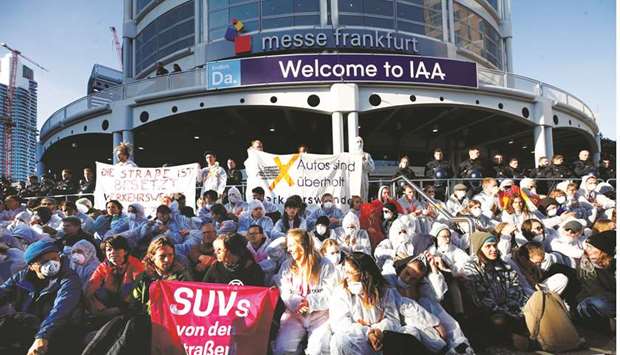Several hundred protesters blocked the main entrance to the Frankfurt International Motor Show (IAA) yesterday.
Wearing white suits, they held up placards with slogans such as “disempower car companies” and “the street is occupied – transportation turning point now”.
The IAA called on Twitter for participants to use other entrances.
However, protesters also blocked one of these entrances.
Police said the protests were peaceful.
The goal is to disrupt the motor show with “peaceful blockades”, according to the organisers of the demonstration.
“We’re taking a clear stand against the destructive transport system for which the world’s largest motor show still stands,” they said.
The demonstrators are demanding cities free of cars, free public transport, and the development of cycle paths.
“A real change towards climate-friendly transport is not compatible with the profit interests of the car lobby,” they said.
Manufacturers unveil new models at the IAA motor show, which was opened by German Chancellor Angela Merkel on Thursday.
During her visit, she praised the auto industry for stepping up its efforts in developing climate-neutral technologies.
But environmentalists have slammed carmakers for starting e-mobility transition efforts too late and for shirking their responsibility for air pollution, especially in regard to the diesel emissions scandal.
On Saturday, thousands of protesters marched in front of the IAA car show venue.
Police in Frankfurt said some 15,000, including many cyclists, took part in the march.
Organisers put the number at 25,000 and said that around 18,000 cyclists had descended on the city.
Merkel’s conservatives and their Social Democrat (SPD) coalition partners held negotiations on Friday about a package of measures expected to expedite Germany’s ambition to double the share of its power from renewable sources to 65% by 2030.
The government is expected to unveil the costly measures on September 20.
“Enough to policies that prioritise cars in our cities,” said Ernst-Christoph Stolper, deputy head of Friends of the Earth Germany, on Saturday. “Pedestrians and cyclists need to conquer the urban spaces that belong to us.”
The protests have urged German carmakers to speed up a transition to electric and hydrogen vehicles, after the 2015 diesel scandal in which Volkswagen admitted to cheating emissions tests.
Germany’s big three, Volkswagen, Mercedes-Benz maker Daimler and BMW, assume that in 10 years about half of their cars will be emissions-free.
Carmakers are expected to invest some €40bn ($44bn) on alternative drive terrains in the next three years, highlighting the urgency to fix the image of an industry tarnished by the diesel scandal and avoid bans on diesel cars in cities.
The death of four pedestrians, including a three-year-old boy, on a Berlin street this month after the driver of a Porsche SUV apparently lost control has sparked a debate about whether cities should ban the large vehicles from their streets.
German car executives responded, saying the tragedy could have happened with any car.
“Car industry, the party is over,” said Christoph Bautz of the Compact organisation, which advocates for progressive politics.

Protesters blocking the entrance to the venue of International Frankfurt Motorshow (IAA).
